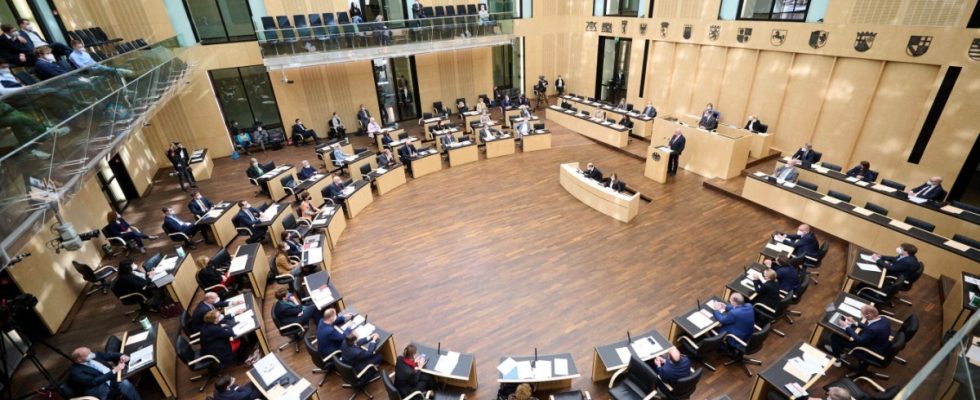The Bundesrat and Bundestag are talking about several consumer-related topics this Friday. A selection of the most important topics:
heaters
The state chamber wants to discuss the controversial plans to replace the heating system. According to a draft for the Building Energy Act, from 2024 onwards every newly installed heating system should be operated with 65 percent renewable energy. In terms of climate protection, the farewell to gas and oil heating should be heralded.
But it is uncertain whether 2024 will actually be implemented as the start date. Politicians are increasingly calling for a later date. Economics Minister Robert Habeck (Greens) was also open to this recently. The Federal Council does not pass a resolution on the draft law in its session. Parallel to the deliberations of the heads of the federal states, the Bundestag is debating a “secure, affordable and climate-friendly heat supply” at the request of the Union.
Smart electricity meter
The Federal Council also wants to pass a law for the more rapid spread of intelligent electricity meters. These smart meters are networked measuring devices for heat or electricity that automatically transmit consumption to the provider and also make it visible to consumers. With this and in combination with variable electricity tariffs, in which the price fluctuates with the supply of electricity from wind and sun, they should be able to align their electricity use more closely with the price.
The left wants the right to an apartment exchange
At the request of the left-wing faction, the Bundestag debated the right to exchange apartments in the early afternoon. According to the opposition party, tenants should be able to swap and move from apartments that are too large to smaller ones and vice versa. The existing rental contracts should therefore be able to be taken over without an increase in rent. In April, the German Tenants’ Association also backed the idea of such an exchange option for seniors and young families. A law will not be passed today. The motion of the left should be referred to the committees.
Hesse wants a new day of remembrance
The state of Hesse is committed to a new national day of remembrance. This is intended to commemorate the birth of democracy in Germany, as can be seen from a motion that the country intends to present to the Bundesrat. Hesse justified the initiative by saying that the revolutionary protests at the beginning of 1848 up to the March Revolution formed the starting point for democratic and federal development in Germany. Finally, on May 18, 1848, the National Assembly met in the Paulskirche in Frankfurt.
The forthcoming 175th anniversary of this event is a good occasion to bring movement into a debate, it said. The Bundesrat should ask the federal government, in agreement with the federal states, to set up an independent commission of historians to propose a suitable date for the day of remembrance.
The Bundesrat in Berlin: The Chamber of States advises on several human-related issues.
(Photo: IMAGO/Christian Spicker/IMAGO/Christian Spicker)
electoral reform
The Bundesrat has allowed the controversial electoral law reform to downsize the Bundestag to pass. In the state chamber there was no majority for Bavaria’s application to call the mediation committee. This means that the project, which does not require the approval of the Bundesrat, can come into force. Bavaria’s Prime Minister Markus Söder (CSU) announced that the Free State would take legal action before the Federal Constitutional Court.
The reform of the electoral law passed by the Bundestag is one of the other topics of the Chamber of States. The number of seats in the Bundestag is to be capped at 630. There are therefore no longer any surplus or equalization mandates. The decisive factor for the strength of a party in parliament will be the result of the second vote alone.
The basic mandate clause also falls away. According to her, parties have also entered the Bundestag with the strength of their second vote result if they were less than five percent but won at least three direct mandates. Every party that wants to get into the Bundestag must get at least five percent of the second votes nationwide. However, parties of national minorities remain exempt from this.
Compromise on whistleblower law
The Bundesrat has approved a whistleblower law that the Bundestag passed on Thursday after months of wrangling. Whistleblowers who uncover abuses in authorities and companies are to be protected from dismissal and reprisals by the package of measures decided on Thursday. In addition, special contact points must be created where reports of fraud, corruption or environmental protection violations are received.
Shortly before Christmas, the Bundestag had already passed such a law, but at the time the Bundesrat stopped the project because the states governed by the Union feared an excessive financial burden on smaller companies. A compromise was therefore worked out in the mediation committee.

